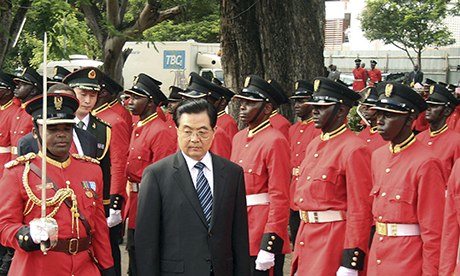Where America brings drones, the Chinese build roads. Al-Shabaab and co march in lockstep with this new imperialism

Hu Jintao, who stepped down as Chinese president last year, in Tanzania on a tour intended to cement China's ties with Africa. Photograph: STR New / Reuters/REUTERS
Countries are "pieces on a chessboard upon which is being played out a great game for the domination of the world", wrote Lord Curzon, the viceroy of India, in 1898. Nothing has changed. The shopping mall massacre in Nairobi was a bloody facade behind which a full-scale invasion of Africa and a war in Asia are the great game.
The al-Shabaab shopping mall killers came from Somalia. If any country is an imperial metaphor, it is Somalia. Sharing a language and religion, Somalis have been divided between the British, French, Italians and Ethiopians. Tens of thousands of people have been handed from one power to another. "When they are made to hate each other," wrote a British colonial official, "good governance is assured."
Today Somalia is a theme park of brutal, artificial divisions, long impoverished by World Bank and IMF "structural adjustment" programmes, and saturated with modern weapons – notably President Obama's personal favourite, the drone. The one stable Somali government, the Islamic Courts, was "well received by the people in the areas it controlled", reported the US Congressional Research Service, "[but] received negative press coverage, especially in the west". Obama crushed it; and last January Hillary Clinton, then secretary of state, presented her man to the world. "Somalia will remain grateful to the unwavering support from the United States government," effused President Hassan Mohamud. "Thank you, America."
The shopping mall atrocity was a response to this – just as the Twin Towers attack and the London bombings were explicit reactions to invasion and injustice. Once of little consequence, jihadism now marches in lockstep with the return of unfettered imperialism.
Since Nato reduced modern Libya to a Hobbesian state in 2011, the last obstacles to Africa have fallen. "Scrambles for energy, minerals and fertile land are likely to occur with increasingly intensity," report Ministry of Defence planners. As "high numbers of civilian casualties" are predicted, "perceptions of moral legitimacy will be important for success". Sensitive to the PR problem of invading a continent, the arms mammoth BAE Systems, together with Barclays Capital and BP, warns that "the government should define its international mission as managing risks on behalf of British citizens". The cynicism is lethal. British governments are repeatedly warned, not least by the parliamentary intelligence and security committee, that foreign adventures beckon retaliation at home.
With minimal media interest, the US African Command (Africom) has deployed troops to 35 African countries, establishing a familiar network of authoritarian supplicants eager for bribes and armaments. In war games a "soldier to soldier" doctrine embeds US officers at every level of command from general to warrant officer. The British did this in India. It is as if Africa's proud history of liberation, from Patrice Lumumba to Nelson Mandela, is consigned to oblivion by a new master's black colonial elite – whose "historic mission", warned Frantz Fanon half a century ago, is the subjugation of their own people in the cause of "a capitalism rampant though camouflaged". The reference also fits the son of Africa in the White House.
For Obama, there is a more pressing cause – China. Africa is China's success story. Where the Americans bring drones, the Chinese build roads, bridges and dams. What the Chinese want is resources, especially fossil fuels. Nato's bombing of Libya drove out 30,000 Chinese oil industry workers. More than jihadism or Iran, China is Washington's obsession in Africa and beyond. This is a "policy" known as the "pivot to Asia", whose threat of world war may be as great as any in the modern era.
This week's meeting in Tokyo between John Kerry, the US secretary of state, Chuck Hagel, the defence secretary, and their Japanese counterparts accelerated the prospect of war. Sixty per cent of US naval forces are to be based in Asia by 2020, aimed at China. Japan is re-arming rapidly under the rightwing government of Shinzo Abe, who came to power in December with a pledge to build a "new, strong military" and circumvent the "peace constitution".
A US-Japanese anti-ballistic-missile system near Kyoto is directed at China. Using long-range Global Hawk drones the US has sharply increased its provocations in the East China and South China seas, where Japan and China dispute the ownership of the Senkaku/Diaoyu islands. Both countries now deploy advanced vertical take-off aircraft in Japan in preparation for a blitzkrieg.
On the Pacific island of Guam, from where B-52s attacked Vietnam, the biggest military buildup since the Indochina wars includes 9,000 US marines. In Australia this week an arms fair and military jamboree that diverted much of Sydney is in keeping with a government propaganda campaign to justify an unprecedented US military build-up from Perth to Darwin, aimed at China. The vast US base at Pine Gap near Alice Springs is, as Edward Snowden disclosed, a hub of US spying in the region and beyond; it is also critical to Obama's worldwide assassinations by drone.
'We have to inform the British to keep them on side," McGeorge Bundy, an assistant US secretary of state, once said. "You in Australia are with us, come what may." Australian forces have long played a mercenary role for Washington. However, China is Australia's biggest trading partner and largely responsible for its evasion of the 2008 recession. Without China, there would be no minerals boom: no weekly mining return of up to a billion dollars.
The dangers this presents are rarely debated publicly in Australia, where Rupert Murdoch, the patron of the prime minister, Tony Abbott, controls 70% of the press. Occasionally, anxiety is expressed over the "choice" that the US wants Australia to make. A report by the Australian Strategic Policy Institute warns that any US plan to strike at China would involve "blinding" Chinese surveillance, intelligence and command systems. This would "consequently increase the chances of Chinese nuclear pre-emption … and a series of miscalculations on both sides if Beijing perceives conventional attacks on its homeland as an attempt to disarm its nuclear capability". In his address to the nation last month, Obama said: "What makes America different, what makes us exceptional, is that we are dedicated to act."

